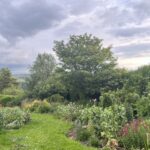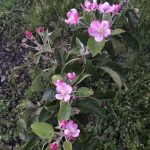I will no longer be drawn into the false narrative on peat free vs peat compost comparisons.
Over the last ten years I’ve been using peat free compost in increasingly large quantities each year to grow every type of vegetable and the majority of ornamental plants available to gardeners, including a number of acid loving plants in ericaceous peat free compost. Although I grow for myself and a small number of client gardens, I grow the equivalent number of plants to a small independent nursery.
Throughout that time I’ve documented what I’ve grown and the compost brands I’ve used openly on my site, in the national press, in gardening magazines and on social media and I’ve never had a problem with any peat free composts I’ve used. Everything grows as expected and exactly the same in every compost I’ve tried. I even conducted a peat vs peat free comparison trial on a number of different crops last year to prove peat free can grow as well as peat, which was as expected, a success for me.
In addition, all leading gardeners and hundreds of the UK’s best plant nurseries have been growing in peat free for years, some for multiple decades (I’ve listed some here).
Yet a small number of people still say to me: “peat free is rubbish”, “peat free isn’t as good as peat”, “peat free is variable” “peat free dries out too quickly”, “my seeds didn’t germinate”, “I must have a bad batch”, “my peat free must have aminopyralid weedkiller in it”, “it doesn’t have enough nutrients”.
Why is it that some people have these problems with their compost that I and peat free growers cannot replicate?
Well, it’s not to say I haven’t had problems growing things. Gardening is full of problems with plants and set backs. That’s what happens when dealing with living things. No matter how many years experience or how good you are at growing, certain things are out of your control.
When did compost become the scapegoat of all gardening problems?
When growing plants, many things are within our control that we also get wrong. There are many things we can get wrong, from watering to feeding, temperature, timing, bad seeds, old seeds, incorrect sowing depths, light levels and many more. I get plenty wrong.
As much as people won’t want to hear this, in the transition to peat free composts, some people are making the compost the scapegoat for all problems when actually it could and most likely is something else. And I suspect this is fuelled by those with a stake in peat compost sales.
When people contact me about their plants growing in peat free compost it has always been problems with one or two of the following: under or over watering, lack of nutrients, temperature, time of sowing, quality or viability of seed.
This is why I’m not experiencing the same problems as those vocal people. I am a trained and experienced horticulturist with 35 years of growing experience in our garden and professionally in recent years in other people’s, with RHS training from a botanic garden to RHS Level 3. I’m fairly good now at identifying and solving plant problems.
I could grow plants in sand and coir with no nutrients in the media whatsoever, instead added by fertilisers in the water, to a point. Aquaponics grow crops like tomatoes in nothing but water and nutrient.
Sure, some peat free compost brands are better than others in the same way peat composts have always had the good and bad brands. Sure, you might get a bad batch, I received a couple of bags this year of old compost with noticeably less nutrients in them. Sure, some composts retain moisture well making early sowings of seedlings more prone to cold. So what? Use a heat mat, sow later or water less.
I’ve shown that I have been capable of trying out different brands to find those I trust. I’ve shown that even with a batch of compost with lower nutrient levels I’ve been able to adapt and adjust the fertilising accordingly. I’ve shown that I’ve been able to spot temperature hampering growth and moving plants to warmer spots to account for it or sown later.
My point is, this is gardening. You can do it too. I may be experienced but I learnt this through trial and error and it made me a better gardener. All composts are organic matter, they will be variable as soil is variable. The brands of peat free I use regularly are consistent. Some organisations will no doubt run peat free comparison trials, which is good for consumers but for me this discussion is now a waste of my time. Nurseries will need more rigorous tests to help their larger operations.
The comparison of peat vs peat free for consumers is, in my opinion, now a non issue driven by companies that sell peat or the spokespeople closely tied to them. I have been able to easily find affordable peat free compost that works for me – and that includes during our years in inner London. I’m not the only one, there are tens of thousands of gardeners growing peat free, hundreds of nurseries and the numbers are growing.
And that’s why I’m done humouring the peat vs peat free compost discussion, it’s time to move on.




Great blog totally agree. For me as a hobby gardener I still couldn’t care less if peat compost is better – I’m still not going to damage the planet for my hobby. And that seems to be what many people are saying – my hobby is more important than the planet. I just don’t get it.
Has echoes for me of the conversation around recycling back in the day (showing my age a bit), which always sounded to me like “I’m too idle to pay attention to the impact of my actions, and too selfish to care in any case”.
Which peat-free products do you like?
Loads of them, I linked to a few in the article here: https://www.jackwallington.com/peat-free-compost-trials-2021/ for me I’m most interested in organic and peat free compost.